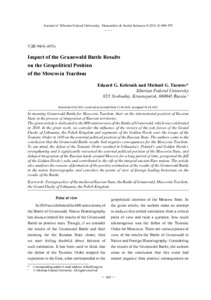Влияние итогов Грюнвальдской битвы на геополитическое положение Московской Руси
Скачать файл:
URI (для ссылок/цитирований):
https://elib.sfu-kras.ru/handle/2311/2307Автор:
Колесник, Э.Г.
Kolesnik, Eduard G.
Тарасов, М.Г.
Tarasov, Michael G.
Дата:
2011-04Аннотация:
In meaning Grunewald Battle for Moscovia Tsardom, their on the international position of Russian
State in the process of integration of Russian territories.
The given article is dedicated to the 600-anniversary of the Battle of Grunewald, which was celebrated
in 2010. In the given work, we consider the influence of the victory of the join forces of the Grand
Duchy of Lithuania, the Polish Kingdom and regiments of the Golden Horde over the troops of the
Teutonic Order in 1410 on the external political position of the Russian State. The authors come to the
conclusion that the Grunewald Battle results had negative consequences for the Moscovia Tsardom.
To our mind, the defeat of the Teutonic Order resulted in Lithuanias, Polands and Golden Hordes
strengthening and it significantly worsened the external political position of the Moscovia State, and
delayed integration of the Russian lands around Moscow for a long period of time, postponed the fall
of the Golden Hordes yoke and contributed to the rift of the integral ancient Russ nation. The article
also analyses the reasons of formation of the positive estimation of the results of the Grunewald Battle
in the native historiography, and considers the points of view of foreign leading historians on the
results of the Battle. Статья посвящена отмечавшемуся в 2010 г. 600-летию Грюнвальдской битвы. В работе
рассматривается влияние результатов победы соединённых сил Великого княжества
Литовского, Польского королевства и отрядов Золотой Орды над войсками Тевтонского
Ордена в 1410 г. на внешнеполитическое положение Русского государства. Авторы приходят
к выводу о негативных последствиях для Московской Руси итогов Грюнвальдской битвы. По
их мнению, поражение Тевтонского Ордена привело к усилению Литвы, Польши и Золотой
Орды, что значительно осложнило внешнеполитические позиции Московского государства,
значительно задержало объединение русских земель вокруг Москвы, отсрочило падение
ордынского ига и способствовало расколу единой древнерусской народности. В статье
анализируются причины формирования положительной оценки итогов Грюнвальдской битвы
в отечественной историографии, а также рассматриваются взгляды ведущих иностранных
историков на результаты сражения.

